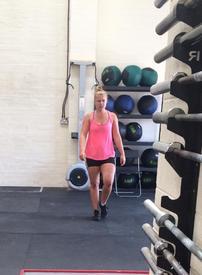Rotator cuff impingement

amy1612
Posts: 1,356 Member
Anyone had a problem with this? I did this yesterday and have been recommended time away from weights, etc (aaaaaagh). Does anyone have any experience/tips for strength training I can do (after a rest week at least, Im not daft) once its eased off a bit.
Thanks in advance
Thanks in advance
0
Replies
-
cameron diaz arm workout - start with itsby bitsy weights 3 lbs, they do it with 5 lbs youtube.0
-
Are you serious?0
-
I'd dial back the weight, for example use light dumbbells. If it is still bothering you I'd simply stop upper body work for a week and see where you are after that. Listen to your body. I've had a torn rotator cuff and went through an up and down rehab (between trying to get strength and flexibility back). The repaired shoulder occasionally flares up and resting it generally solves the problem. This is just my personal experience.0
-
I'm having an issue with my right rotator cuff. I've had to come down in weight alot. You can also look on Youtube for workout videos for it and some at home testing to see how bad it is.
I plan on taking 4 days off for a trip I have coming up so I'm hoping that will help it some. Until then I have to go a little easy because I don't want an injury to stop me altogether.0 -
If you have access to physiotherapy then get in ASAP, you could develop a frozen shoulder (impingement syndrome ). You need to keep that shoulder moving but in a safe way. A physiotherapist can show you what to do and what to avoid.
I worked in a clinic for years and shoulder injuries by FAR were the most common.
Hang in there, it will be good as new if you take care if it.0 -
Sounds too easy, doesn't it, because you are so fit? Or if too hard, do it without any weights. Even a pregnant woman can do this workout. It strengthens all the arm muscles.
When I was having rotor cuff problems, my physical therapist had me lie down on my side, then rotate my arm without any weights (impossible to do this with weights) very slowly. This helps strengthen the less used muscles of the rotor cuff. We have several muscles to stabilize the most flexible joint in the body. Three of them are call the spinatus muscles and two are called the teres. If you tear one, you still have the others that can be developed to compensate.
I think you should get in to see a physical therapist for your individual needs.
RuthAre you serious?0 -
If you have access to physiotherapy then get in ASAP, you could develop a frozen shoulder (impingement syndrome ). You need to keep that shoulder moving but in a safe way. A physiotherapist can show you what to do and what to avoid.
I worked in a clinic for years and shoulder injuries by FAR were the most common.
Hang in there, it will be good as new if you take care if it.
I saw the physio this morn and theyve given me a sheet with some exercises. Im devastated as had just managed to up my OHP to 30kg and now am gonna have to have some time away from that Hopefully the rest will be good for increasing strength once Im back to it.
Hopefully the rest will be good for increasing strength once Im back to it.
Ruth I lift heavy, so the thought of 'itsy bitsy' dumbells make me want to barf,lol.0 -
I had a problem with my right rotator cuff earlier this year.
Take some time off to rest
Do some light weight (3-5) warm up exercises
There are a lot of demos on You-tube for some help.0 -
-
I just want to add that a rotator cuff injury and impingement syndrome are very different. Rest is not the answer with impingement, it will get worse, adhesions build with rest and cause sticking inside the acromioclavicular joint causing pain and decreased movements with flexion (raising arm up in front). RTC's are common too and even those injuries require lots of exercise. Shoulders are tricky, but they must be kept moving. Lots of ice with acute injury and heat therapy later on.0
-
Impingement won't go away on its own.
Generally you attack it by strengthening the cuff muscles (internal/external rotations, etc...), shoulder mobility work and stretching (dislocates, wall slides, door stretch), and correcting shoulder posture and muscular imbalances (start with a pencil test, in a perfectly balanced shoulder with perfect posture, the pencils will natually go to infinity).
In most people push/pull strength is totally out of whack and the shoulders hunch forward due to poor posture and tight overdeveloped pushing muscles (relative to pulling muscles, especially horizontal). Most people also have poor shoulder mobility and weak cuff muscles. Add in generally poor form for bench and overhead pressing (elbows should be in, always) and you have a very high risk of impingement and other shoulder problems.
Ease back on the triggers (overhead work especially) and fix the underlying physiologial issues and you can eliminate the impingement.0 -
I dislocated my shoulder earlier this week doing shoulder presses and have pain in the shoulder. Doctor recommended 1-2 weeks off than to start right back into my routine, but with a lighter weight than when I injured. I was using a 20# dumbell at the time, I will back off to 10 than maybe 15 when I start back up.0
-
Impingement won't go away on its own.
Generally you attack it by strengthening the cuff muscles (internal/external rotations, etc...), shoulder mobility work and stretching (dislocates, wall slides, door stretch), and correcting shoulder posture and muscular imbalances (start with a pencil test, in a perfectly balanced shoulder with perfect posture, the pencils will natually go to infinity).
In most people push/pull strength is totally out of whack and the shoulders hunch forward due to poor posture and tight overdeveloped pushing muscles (relative to pulling muscles, especially horizontal). Most people also have poor shoulder mobility and weak cuff muscles. Add in generally poor form for bench and overhead pressing (elbows should be in, always) and you have a very high risk of impingement and other shoulder problems.
Ease back on the triggers (overhead work especially) and fix the underlying physiologial issues and you can eliminate the impingement.
Thanks . I generally have excellent shoulder mobility, theyre usually very flexible. I'll work on strengthening, you're definitely on the mark on push vs pull. Ive been working a lot on strengthening pull recently.
. I generally have excellent shoulder mobility, theyre usually very flexible. I'll work on strengthening, you're definitely on the mark on push vs pull. Ive been working a lot on strengthening pull recently.
Is it best to just keep stretching it etc? Do you know any good strengthening exercises?0
This discussion has been closed.
Categories
- All Categories
- 1.4M Health, Wellness and Goals
- 398.1K Introduce Yourself
- 44.7K Getting Started
- 261K Health and Weight Loss
- 176.4K Food and Nutrition
- 47.7K Recipes
- 233K Fitness and Exercise
- 462 Sleep, Mindfulness and Overall Wellness
- 6.5K Goal: Maintaining Weight
- 8.7K Goal: Gaining Weight and Body Building
- 153.5K Motivation and Support
- 8.4K Challenges
- 1.4K Debate Club
- 96.5K Chit-Chat
- 2.6K Fun and Games
- 4.8K MyFitnessPal Information
- 12 News and Announcements
- 21 MyFitnessPal Academy
- 1.5K Feature Suggestions and Ideas
- 3.2K MyFitnessPal Tech Support Questions





 http://www.youtube.com/watch?v=_W1iwZhgcNU&list=PL2BF2A2FC9FAD6252&index=4&feature=plpp_video
http://www.youtube.com/watch?v=_W1iwZhgcNU&list=PL2BF2A2FC9FAD6252&index=4&feature=plpp_video http://www.youtube.com/watch?v=9-7SetOe9zk&feature=BFa&list=PL2BF2A2FC9FAD6252
http://www.youtube.com/watch?v=9-7SetOe9zk&feature=BFa&list=PL2BF2A2FC9FAD6252 http://www.youtube.com/watch?v=x9bvVGFYl-8&feature=BFa&list=PL2BF2A2FC9FAD6252
http://www.youtube.com/watch?v=x9bvVGFYl-8&feature=BFa&list=PL2BF2A2FC9FAD6252
